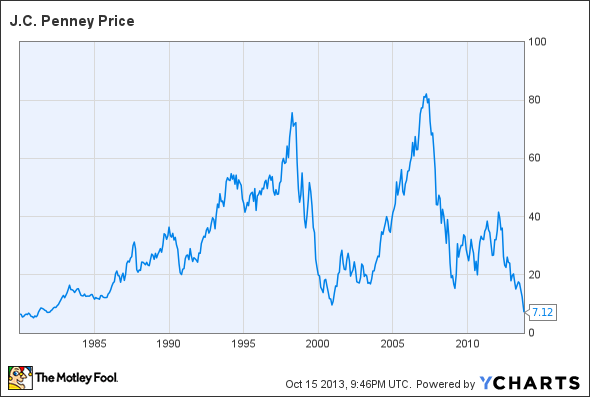J.C. Penney (JCP +0.00%) stock had yet another nasty fall on Tuesday, dropping nearly 9% to $7.17 -- a level not seen since the 1980s.
J.C. Penney Stock Chart: 1980-present, data by YCharts.
There was no important news from the company, which has left people wondering what could have caused this big drop. Some retail-watchers pointed to a Wall Street Journal report that Burberry CEO Angela Ahrendts -- who was just announced as Apple's new senior vice president of retail and online stores -- was a top candidate for the chief executive post at J.C. Penney.
However, a more likely cause of Penney's tumble was the rumor that the company had hired bankruptcy lawyers. Naturally, the company immediately said there was no truth to this rumor, but this denial did not cause the stock to bounce back at all. At the end of the day, J.C. Penney stock was hovering just a few pennies above its intraday low.

J.C. Penney's inability to convince investors to ignore the bankruptcy rumor is both disturbing and understandable. The retailer has forfeited all credibility over the last two years as executives have repeatedly played down the extent of its struggles. Now the company is at the mercy of the rumor mill, which could be quite dangerous if suppliers and/or employees get spooked.
The credibility gap opens
J.C. Penney began to experience a credibility gap in May 2012, when it reported earnings results for the first time after then-CEO Ron Johnson implemented his new pricing and merchandising strategies. Revenue dropped by a stunning 20%, yet Johnson asserted that the transformation was "ahead of schedule" and maintained an upbeat tone at the company's earnings presentation.
The situation worsened through the remainder of the fiscal year. Sales declines were worse in each successive quarter even though management claimed to be implementing initiatives that would stem or reverse the drops. By the fourth quarter, J.C. Penney's comparable-store sales drop had reached a whopping 31.7%.
The last straw
When J.C. Penney finally replaced Johnson with his predecessor, Mike Ullman, the company had a chance at a fresh start. While J.C. Penney's sales continued to slide in the first two quarters of fiscal 2013, Ullman could plausibly blame the poor performance on Johnson's policies.
However, he forfeited all credibility with an abrupt flip-flop in late September. On Tuesday, Sept. 26, in response to rumors that J.C. Penney was looking to raise cash, Ullman stated that he did not see any need to raise liquidity this year. His statement helped J.C. Penney stock reverse its losses.
However, by that afternoon J.C. Penney had proposed a sale of 84 million new shares. The deal was priced at $9.65 per share on the following day, marking a new low for company stock. Ullman's public statement that the company was not looking for new financing when it was clearly scrambling for cash destroyed his credibility with investors.
No trust left
By whitewashing the extent of the company's troubles, J.C. Penney executives were able to prop up the stock price for a long time. However, the company is now paying a heavy price for that brief respite. Quite simply, nobody believes a word that any J.C. Penney executive says anymore.
This could become a major problem insofar as J.C. Penney relies on the confidence of suppliers and factors (the companies that finance suppliers) to operate smoothly. The ongoing U.S. fiscal crisis is likely to exacerbate what is already a weak consumer spending environment, which could lead to more rumors of J.C. Penney's demise. These could become self-fulfilling prophecies if vendors or factors start demanding cash on delivery out of fear that the retailer could go bankrupt.
There is a lesson here for CEOs everywhere. It's better to come clean early and take a beating in the market when your company has problems rather than trying to minimize the situation. Once you lose your credibility, a short-term drop in your company's stock price could be the least of your worries.







